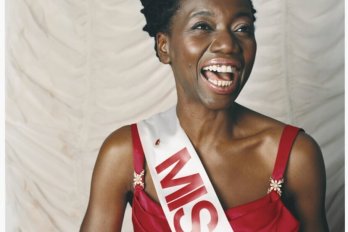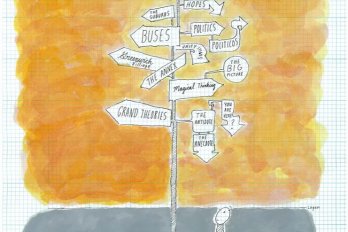gaza city—Ahmed Daghmash doesn’t carry himself with the bravado of a typical Gaza militant. His soft eyes and casual manner make it easy to believe he is, as he says, a Russian-educated engineer who once ran a business he hoped would help reopen Gaza City’s port. But since his brother Mahmoud and cousin Ashraf were shot dead by Hamas gunmen on December 19, his equanimity has concealed a cool fury and a dedication to violent revenge.
From the moment Hamas defeated Fatah in last year’s legislative elections, the two have been at each other’s throats, with hundreds dead and wounded. And the Daghmash family—among Gaza City’s largest, claiming about 12,000 members, a quarter of them armed—supplies militants to every army: Hamas, Fatah, and a host of smaller groups, including the notorious Popular Resistance Committee. Many believe that Mumtaz Daghmash heads the prc’s religious offspring, a secretive group of militants known as Jaysh Islam, which along with the prc and the Qassam Brigades claimed responsibility for last summer’s kidnapping of Israeli soldier Gilad Shalit.
But Ahmed doesn’t care much about all that. He sees the fighting between Hamas and Fatah—and between Palestinians and Israelis, for that matter—as wars that kill soldiers. But because his brother and Ashraf were slain off the “battlefield,” allegedly in a dispute over identity papers, the Daghmash clan has put aside its normal allegiances to various parties. Ahmed is leading the family in a fight for justice against Hamas, and he’s not losing.
In Gaza, your family name defines you. There are good families, bad families, militant families, and, in the case of the Daghmash, mafia. They are notorious throughout the Gaza Strip for gun-running, smuggling, and, when provoked, pursuing blood feuds with medieval vengeance. They are widely suspected to have spent much of last year abducting foreign journalists—a common ploy lesser-known groups use to extort favours from those with a profile in the West—as part of an argument with Fatah and Hamas over the allocation of security-service jobs. Word on the street was that Hamas failed to deliver money promised for the release of a Fox News crew the Daghmash had kidnapped, provoking a dispute that ratcheted up tensions between the clan and Hamas even before Mahmoud and Ashraf were killed.
When Ahmed’s war began, the Daghmash section of Gaza City became a no-go zone for outsiders. Burned-out cars and dumpsters filled with sand now block main roads, forcing traffic to enter through checkpoints where armed guards turn back vehicles driven by interlopers. Huge walls of cactus, barbed wire fences, and dirt berms surround the family’s many acres of lemon orchards and farmland. Masked men armed with automatic weapons and rocket-propelled grenades prowl the area at night to deter attacks.
It’s amid this atmosphere that I set out to speak with Ahmed. I soon find myself sitting in a Daghmash car with windows and windshield tinted so dark that I can’t really see out. My driver takes me on a twenty-minute evening ride around Gaza City before pulling into a field and shutting off the headlights. After leaving me sitting there for a while, he returns wearing a black mask and carrying an AK-47, and announces in Arabic that he has a surprise for me. A nice surprise or a Fox News surprise, I inquire. He laughs and shrugs, then relieves me of my mobile phones and removes their batteries. Driving now without headlights, we are surrounded by human silhouettes fanned out around the field, and before long a half dozen of them approach.
At first the men insist they are merely protecting Daghmash land from Hamas and rival families. But as we talk, it emerges that they are furious with Hamas both for the deaths of Ahmed’s two young relatives and more generally for failing to deliver any semblance of security. After listening worriedly to the whine of an Israeli drone passing overhead, the apparent leader announces that the sheikh of Jaysh Islam is willing to talk to me. I ask permission to smoke, hoping that it will calm my nerves. “Of course,” the spokesman answers, “but not in front of the sheikh.” I take out a cigarette and begin to light it, asking when I’ll meet him. “I am the sheikh,” the giant man standing next to me says. I break the cigarette trying to jam it back into the pack.
A few days later, when Ahmed shows up unannounced to talk to me while I’m at his mother’s house, it becomes clear that that first, secretive meeting was my audition—he was no doubt one of the men in the field that night. Now he wants to explain why he’s abandoned engineering and declared war on Hamas.
Hamas still hasn’t responded to Fatah or anyone else over two recent casualties—mid-level officials rumoured to have been gunned down in violation of the ceasefire—so the street is convinced that the Daghmash did the hit. (Many Gazans discuss such matters the way other people follow sports teams.) I put it to Ahmed, but he plays coy; for now, he seems to enjoy keeping his enemies guessing. Another family member has told me that he honestly doesn’t know if Ahmed killed the men, but that if he did, “it is his right.”
“My brother was a soldier for Fatah sometimes,” Ahmed explains. “So if he had died in the recent fitna (discord) then I would not take any revenge. But he was taken in the streets by these Hamas men and shot for no reason. So we found the names of the men who did it and we asked the Hamas police to arrest them. This request was refused.” (A Hamas official later tells me that while in an ideal world his forces would be the honest police of Palestine, for now they are “Hamas—only Hamas.”)
Ahmed is serious but restrained as he quietly describes his plans while his mother, Taman, wails about revenge and the need for blood. “We know the eighteen men,” he says. “Two tried to stop the others and we will spare them. Six of them shot Mahmoud and played with him while he was wounded. I will not rest until they are dead. The ten others were lookouts or stood by and did nothing. Some I will shoot in the leg or arm and the others we will forgive.”
Later that week, I walk through a Daghmash lemon grove with Ahmed and six of his men. He sleeps in the fields at night and cannot safely stay in one place for very long. But here, today, he seems relaxed. His men—kids, really—drive me crazy with demands that I photograph them in silly, macho stances: guns up and walkie-talkies held to mouths like they’re issuing orders. I finally demand that one young man knock it off, flashing him an annoyed glance. Without any drama in his voice, he explains that he shot one of the Hamas men and he’s at the top of their list. He wants to make sure his family has the best possible martyr picture for his funeral.





